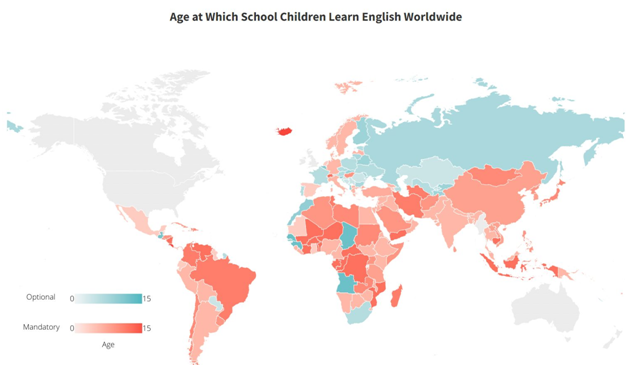
TEFL Diploma or TEFL Certificate Course: Which One Is Right for You?
The demand for learning English has been skyrocketing in every corner of the world. According to preply.com , in most of the country, it’s mandatory of learning English for children of age 0-15.

Source: preply.com
These factors have opened the door to plenty of teaching opportunities for those who have pursued course like 120 hour TEFL Course Online and who are looking to build a TEFL career in their favourite destination.
However, every individual who’s interested in making a TEFL career might hear terms like TEFL Diploma and TEFL Certificate course, both may seem the same but they are totally different from each other.
In this blog post, we will get to know the difference between them in detail to gain better clarity on which option will align with your career better.
So, without any further delay, let’s get started.
Understanding TEFL Diploma
A TEFL diploma is a comprehensive qualification that goes beyond the standard TEFL certificate. It typically involves more extensive training, additional study hours, and in-depth modules, that cover a wide range of topics related to teaching English as a foreign language.
Additionally, you will also get specialist training in teaching Business English to professionals and teaching English online.
As TEFL Diploma takes longer to complete, after completing 180 hours of training you can start applying for teaching jobs and continue your Diploma course at the same time.
Understanding TEFL Certificate
A TEFL certificate is an entry-level qualification compared to TEFL Diploma that equips you with the necessary skills and knowledge to start teaching English as a foreign language. It typically involves a 120-hour training program that covers essential teaching methodologies, lesson planning, classroom management, and language assessment.
5Key Differences Between TEFL Diploma and TEFL Certificate
1. Time Commitment
A TEFL certificate course usually takes around four weeks to complete, while a TEFL diploma requires a longer time commitment, typically double the duration of a certificate course. If you’re willing to invest more time into your TEFL training, a diploma may be the right choice for you.
2. Cost
TEFL diplomas are generally more expensive than TEFL certificates. However, the additional cost is justified by the comprehensive nature of the diploma program and the specialized modules it offers. The investment in a TEFL diploma can lead to access to higher-paying jobs in the field.
3. Skills Acquired
Both TEFL diplomas and TEFL certificates equip you with the essential skills needed to teach English as a foreign language. However, a TEFL diploma provides more intensive learning modules that delve deeper into teaching methodologies, classroom management techniques, and specialized areas such as teaching business English or young learners. If you’re looking to develop a diverse set of teaching skills, a TEFL diploma may be the better option.
4. Recognition
While both TEFL diplomas and TEFL certificates are globally recognized qualifications, the additional study hours and advanced skills gained through a TEFL diploma can give you a competitive edge when applying for TEFL jobs. Employers often value the in-depth knowledge and expertise that comes with a diploma, which may increase your chances of securing desirable TEFL positions.
5. Training Support
TEFL certificate courses provide a solid foundation for teaching English as a foreign language, covering the fundamental principles and techniques. In contrast, TEFL diploma courses offer not only advanced skills and qualifications but also additional training support to help you excel in your teaching career. The extra support can be invaluable, especially for those who are new to teaching or need further guidance.
What Employers Look for in TEFL Qualifications?
When applying for TEFL jobs, employers consider several factors when evaluating your TEFL qualifications. While there is no one-size-fits-all answer, the following criteria are typically taken into account:
1. Accreditation
Employers value TEFL qualifications from reputable and accredited course providers. It is essential to ensure that the TEFL course you choose is accredited by a recognized institution or regulatory body. Accreditation ensures that the course meets specific standards and provides you with a quality education.
2. Duration and Study Hours
The duration and study hours of your TEFL course can influence how employers perceive your qualifications. In many countries, a 120 hour TEFL certificate is the industry standard and sufficient for entry-level TEFL jobs. However, a TEFL diploma with extended study hours can demonstrate a higher level of commitment and expertise.
3. Specialization
Depending on the specific teaching context, employers may prioritize candidates with specialized TEFL qualifications. If you’re targeting a specific niche, such as teaching business English or exam preparation, acquiring additional certifications or modules in these areas can make you a more competitive candidate.
4. Practical Experience
While not always a requirement, practical teaching experience can enhance your employability in the TEFL field. Some TEFL courses include observed teaching practice or provide opportunities for you to gain real-world teaching experience. Highlighting any practical teaching experience, you have can give you an advantage over other candidates.
5. Additional Skills
Employers may also consider any additional skills or qualifications you possess that are relevant to the TEFL field. This could include knowledge of a second language, experience living or working abroad, or certifications in areas such as educational technology or intercultural communication.
Both TEFL Diploma and TEFL Certificate course is Rewarding
Choosing between TEFL Diploma and a TEFL Certificate course is every individual own personal decision which depends on many factors like goals, past teaching experience, or any other factor. Both qualifications could lead to a fulfilling TEFL teaching career.
On one side, TEFL Diploma takes a longer duration to complete but it’s more rewarding and gives you the opportunity to bag high-paying jobs and on the other hand, TEFL Certificate course takes less time to compare to TEFL Diploma, less costly and entry-level qualification which is sufficient enough for anyone who’s eyeing to teach in their favourite foreign destination by pursuing 120 hour TEFL Course.
Consider factors such as time commitment, cost, skills acquired, recognition, and training support when making your decision. Ultimately, the right TEFL qualification for you is one that aligns with your career aspirations and helps you stand out in the competitive TEFL job market.





